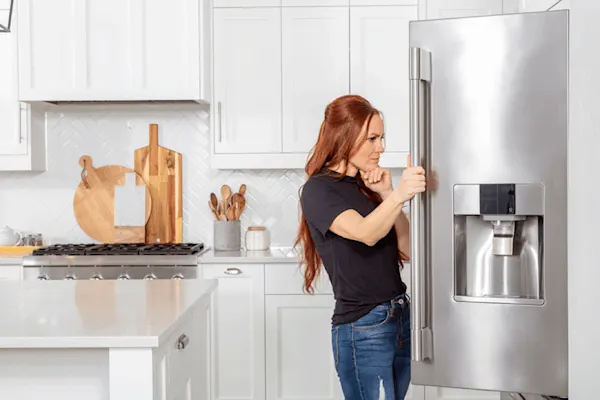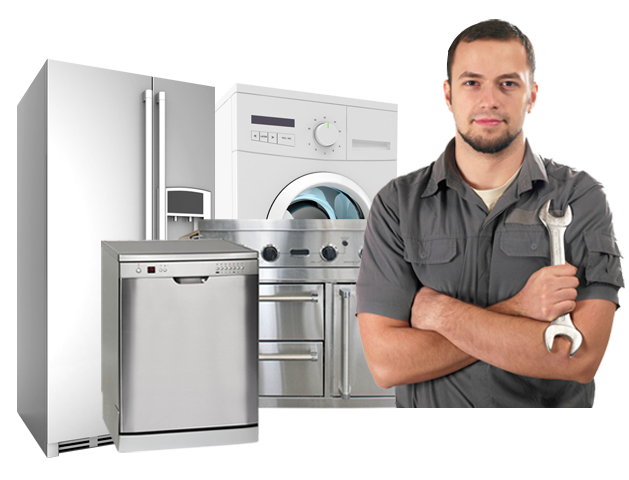The Ultimate Overview to Comprehending Appliance Repair Work at Home
When your fridge stops cooling down or your stove declines to warm, it can really feel overwhelming. Understanding device repair in your home can save you money and time. You'll find out to identify symptoms, utilize important devices, and adhere to a methodical troubleshooting procedure. Before you begin, there are critical safety and security preventative measures you require to take right into account. What are the most usual issues, and how can you fix them? Let's discover the fundamentals.
Typical Home Appliance Problems and Their Symptoms
When your devices begin acting up, it's important to acknowledge the signs beforehand. Neglecting them can result in bigger issues and expensive repairs. If your fridge isn't cooling down correctly, you could see cozy places or condensation forming. This can indicate a stopping working compressor or an obstructed vent.Your dish washer may show problems via unclean meals or uncommon noises during cycles. If you hear grinding or clanking, it's time to investigate.A cleaning device that will not spin or drain pipes can leave you with soaked laundry, recommending a blocked drain or a malfunctioning pump.Lastly, if your oven's temperature seems off or it takes permanently to pre-heat, you might be handling a defective thermostat. By staying alert to these symptoms, you can deal with issues before they rise into major fixings.
Vital Tools for Home Appliance Repair Work
When you're taking on home appliance fixings at home, having the right tools is crucial. Fundamental hand tools like screwdrivers and pliers will certainly aid you disassemble and take care of numerous home appliances, while electric testing devices assure you're working securely with circuitry. Let's go over what you need to start on your repair service trip.
Basic Hand Tools
Having the right tools is vital for reliable device repair work in your home. Beginning with a reliable screwdriver set, including both flathead and Phillips types, as screws are usual in device assembly. Pliers are additionally important; they assist with gripping, turning, and cutting cords or little elements. A set of needle-nose pliers can get to tight places conveniently. You'll require a great flexible wrench for tightening up or loosening nuts and bolts. An utility knife is handy for cutting with packaging or insulation. Don't neglect a tough workbench or surface area to securely organize your devices and components. With these standard hand tools, you'll be well-prepared to take on most home appliance repairs that come your way.
Electrical Screening Gadgets
Alongside standard hand tools, electric testing devices play an essential duty in appliance fixing. These devices assist you detect electric issues and assurance devices function securely. A multimeter is essential; it determines voltage, existing, and resistance, enabling you to pinpoint problems promptly. A non-contact voltage tester is an additional must-have, allowing you find online wires without making straight get in touch with, enhancing your safety and security. Secure meters are excellent for determining existing circulation in cords without disconnecting them, saving you time and effort. In addition, circuit testers can swiftly inspect if electrical outlets are operating appropriately. By utilizing these gadgets, you'll streamline your troubleshooting process and improve your repair skills, making appliance maintenance a great deal easier.
Step-by-Step Guide to Diagnosing Appliance Issues
When your appliance acts up, it can be irritating, but detecting the problem doesn't need to be overwhelming. You'll discover to determine typical issues and use efficient troubleshooting strategies. Allow's go through the actions to get your device back in working order.
Typical Appliance Problems

Fixing Methods Described

Repairing Major Kitchen Devices: A Closer Look
Have you ever wondered how to take on common problems with your cooking area appliances? Repairing major kitchen appliances like refrigerators, stoves, and dish washers can be less complicated than you believe. Start by determining the trouble-- whether it's a fridge not cooling or a stove that will not warm. Often, a simple reset or checking the power resource can address the issue.For refrigerators, tidy the condenser coils and inspect the door seals. If your stove's not heating, evaluate the burner and thermostat. Dishwashing machines might simply need a clean filter or a reset to obtain them back in activity. Constantly disconnect the home appliance before diving into repair work to ensure your safety.Don' t fail to remember to get in touch with the user guidebook for details repairing tips connected to your version. With a little bit of patience and the right devices, you can with confidence tackle home appliance repair work and conserve money in the procedure!

Troubleshooting Laundry Equipments: Tips and Techniques
When your washing appliances start acting up, it can feel frustrating, yet repairing them does not need to be a trouble. Begin by checking the power supply. Confirm the home appliance is connected in and the electrical outlet is functioning. Next off, check the door or lid switch; a malfunctioning button can protect against the equipment from operating.For washing machines, if it's not rotating, look for unbalanced loads. Rearranging the clothing could fix the issue. If your dryer isn't home heating, clean the dust filter and examine the air vent for blockages.Listen for unusual noises; they can show a problem. If your device is leaking, check the pipes for splits or loose links. Paper any kind of error codes shown on digital screens, as they can lead you in determining the problem. Consult the individual guidebook for certain repairing pointers related to your version.
Safety Precautions to Take Throughout Fixes
Before you begin any kind of appliance repairs, it's necessary to prioritize security to avoid crashes or injuries. Unplug the appliance or turn off the circuit breaker to assure no power reaches it while you work. Use shielded devices to decrease sites the threat of electric shock. Use safety goggles and handwear covers to shield on your own from sharp edges or debris (Lg Dryer repair near me Dependable Refrigeration & Appliance Repair Service).Make certain your office is clean and well-lit, so you can see what you're doing. Maintain youngsters and animals away from the location to avoid diversions and potential hazards. If you're handling gas devices, be extra careful; look for leaks prior to proceeding.Take your time, and do not hurry through fixings. If you feel uncertain regarding any type of action, it's far better to pause and research study than to presume. Following these safety measures will aid develop a much safer environment for your DIY appliance fixing task
When to Call a Professional for Aid
Just how do you recognize if it's time to hire an expert for appliance fixings? If you've tried basic troubleshooting without success, it's a clear indication. If your device still will not begin or reveals unusual noises after resetting it, do not be reluctant to look for professional help.When you notice leaks, smoke, or shedding scents, focus on security and call a pro instantly. These issues can result in more considerable damage or present dangers to your home.Also, if your home appliance is under guarantee, calling a specialist is frequently the finest path. They can guarantee that repair work won't nullify your warranty, conserving you cash in the long run.Finally, if you're uncertain or unpleasant with complex fixings, it's smart to leave it to the experts. Bear in mind, dealing with complex problems without the right knowledge can lead to expensive errors. Trust fund a specialist when in question!
Regularly Asked Questions
Exactly How Can I Prevent Device Troubles in the Future?
To prevent device problems in the future, you need to carry out normal maintenance, look for wear and tear, tidy filters, and stay clear of overloading. Staying positive will certainly aid expand their lifespan and keep them running smoothly.
What Are one of the most Typical DIY Appliance Repair Service Mistakes?
You could overlook security preventative measures, avoid troubleshooting actions, or use incorrect tools when trying do it yourself home appliance fixings. Rushing the procedure or ignoring producer standards can cause more considerable issues and expensive blunders. Remain client and educated!
Just how Do I Know if a Component Requirements Substitute?
You can tell if a component requires substitute by looking for uncommon sounds, leaks, or inconsistent performance. If the appliance has a hard time to run properly or shows visible damages, it's most likely time for a replacement.
Can I Utilize Generic Components for Appliance Services?
Yes, you can use generic components for home appliance repairs, however ascertain they're compatible - Kenmore Dryer Repair Oro Valley Dependable Refrigeration & Appliance Repair Service. Generic parts may save you money, however they might affect performance or longevity, so weigh your choices meticulously prior to making a decision
What Service Warranties Cover Appliance Fixes?
A lot of device service warranties cover repair work for producing flaws, however they usually leave out damages from abuse. Inspect your service warranty terms carefully, as some may need making use of licensed specialists and initial more information parts for protection to remain valid.